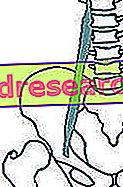Related articles: Hyperpnea
Definition
Hyperpnea is the increase in the depth of the breaths, which follow one another at a normal frequency. The result is an increase in pulmonary ventilation, which normally (in the adult at rest) is about 500 cc of air per minute.
The most common example of hyperpnea is physiologically at the end of a physical effort. The increase in pulmonary ventilation, in fact, reflects a compensation of respiratory gases, which improves blood oxygenation and removes acids. Hyperpnea can also be observed in toxic states (eg alcohol abuse), metabolic (eg metabolic acidosis), infectious (eg sepsis) and in cases of emotional tension.
However, it is not to be confused with dyspnea, which indicates an alteration of the rhythm of the respiratory acts (difficult and labored breathing).
Hyperpnea is considered for the evaluation of epilepsy. Together with intermittent light stimulation, in fact, it is one of the so-called "activation tests" (in practice, it can cause epileptiform phenomena to appear).
Possible Causes * of Hyperpnea
- Metabolic acidosis
- Heart failure
- Heart failure
- Sepsis
- Sinusitis



